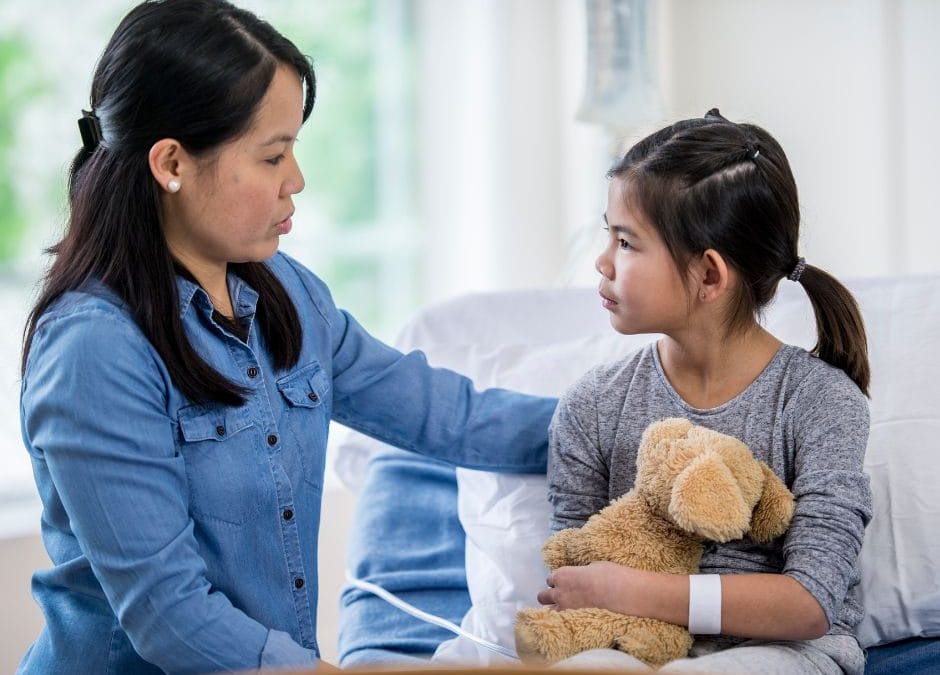Children who have experienced complex trauma can display challenging behaviours that can be difficult to understand and manage. These behaviours often result from early developmental trauma, such as experiencing abuse and/or neglect within their primary attachment relationship. This can lead to difficulties regulating emotions and subsequently their behaviours. At Purple House Clinic (PHC), we are dedicated to helping people understand the underlying causes of these behaviours and providing evidence-based strategies to help children with complex trauma.
Dysregulation is one of the primary underlying causes of challenging (disruptive) behaviours in children with complex trauma. Due to their early experience of traumatic relationships, the child is likely to perceive relationships as frightening and unpredictable and view themselves as unloveable and a bad person. Situations may trigger emotional distress which often presents as challenging behaviour. As well as this, complex trauma and emotional dysregulation can lead to difficulties in forming and maintaining healthy relationships, as children may struggle to trust others and fear abandonment. Other factors, such as sensory sensitivities, anxiety, depression, and learning difficulties, can also contribute to challenging behaviours in children with and without a history of complex trauma. Sensory sensitivities, for instance, can lead to meltdowns or other distressed behaviours when a child is exposed to certain stimuli. Anxiety and depression can cause a child to withdraw or act out in response to stressful situations, learning difficulties may also lead to frustration and other challenging behaviours.
When working with children, it is essential to consider developing personalised and individual treatment plans to create a safe and predictable environment to help them feel more secure and stable. Understanding the child’s early attachment relationships and their understanding of themselves, others and relationships is essential in supporting parents and children with complex trauma who display challenging behaviours. Therapy involves helping the child and parent to build a secure attachment through specific types of therapy, helping to child to learn to emotionally regulate though sensory, talking or play therapies.
Providing opportunities for sensory regulation is another important aspect of helping complex trauma. This may involve using sensory tools like fidgets or weighted blankets, providing a quiet space where the child can retreat when feeling overwhelmed, or incorporating sensory activities like deep pressure or movement breaks into the child’s routine. Using trauma-informed language is also vital in supporting children with complex trauma. This involves acknowledging the child’s experiences and feelings in a sensitive and supportive way without minimising or invalidating their emotions. Instead of telling a child to “calm down,” we might say something like “I can see that you’re feeling upset right now. Let’s take some deep breaths together to help you feel better.”
Seeking professional support is essential for children who display challenging behaviours. This may involve working with a therapist specialising in trauma-informed care, seeking support groups for parents and caregivers, or consulting with other professionals like paediatricians or educators. By seeking professional support, children and their families can then access the resources and guidance they need to achieve the best possible outcomes.
Our Support
At PHC, we are committed to understanding and addressing the complex trauma that children face and we work with the Local Authority supporting children who are adopted or in the care of the local authority, providing a range of therapies including Dyadic Developmental Psychotherapy, Theraplay and Sensory Integration Therapy. Since 2020, our Leicester clinic has partnered with a regional YMCA project known as Shine, who provide a framework to support accommodation providers to become more aware of the multiple disadvantages young homeless people face. They also promote a trauma informed approach across the breadth and depth of YMCA services.
Hannah Deignan, Shine’s Regional Complex Needs Project Co Ordinator, commented: “Purple House Clinic Leicester has provided a range of training and activities to seven YMCAs to support our model in practice. This included understanding complex trauma and how it might present itself in the behaviours and relationship styles of the young people we work alongside, and an ongoing package of support following on from the training to support each organisation to be able to put their new knowledge into practice.
“The activities and support provided by PHC has been invaluable. They offer clinical expertise which is so often missing within provision for young homeless people, but so very needed. We initially only planned to have clinical psychology input for a period of six months but are now three years in, and still working with PHC. They’ve worked with us to find sustainable ways to facilitate reflective spaces and improved our understanding of complex trauma and our approaches to young people who have experienced it. This has resulted in young people more consistently experiencing knowledgeable, empathic, safe and trusted adults across the YMCA.”
By taking a trauma-informed approach that considers the underlying causes of these behaviours, we can provide practical strategies for managing and reducing challenging behaviours. So, why not get in touch today and see how we can help you?

